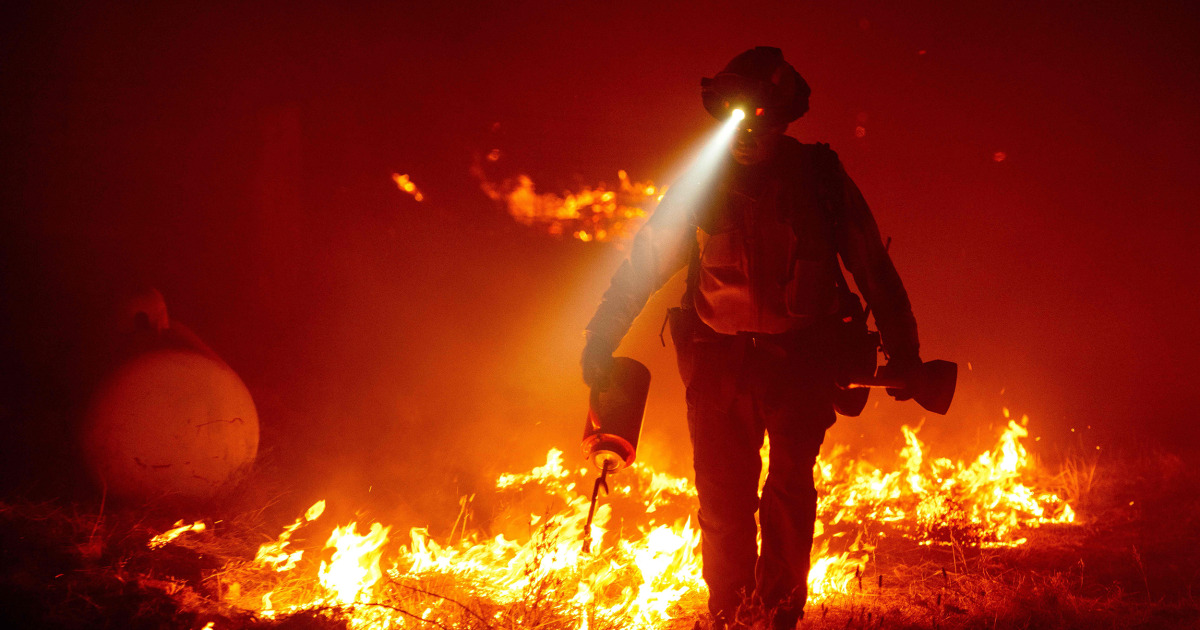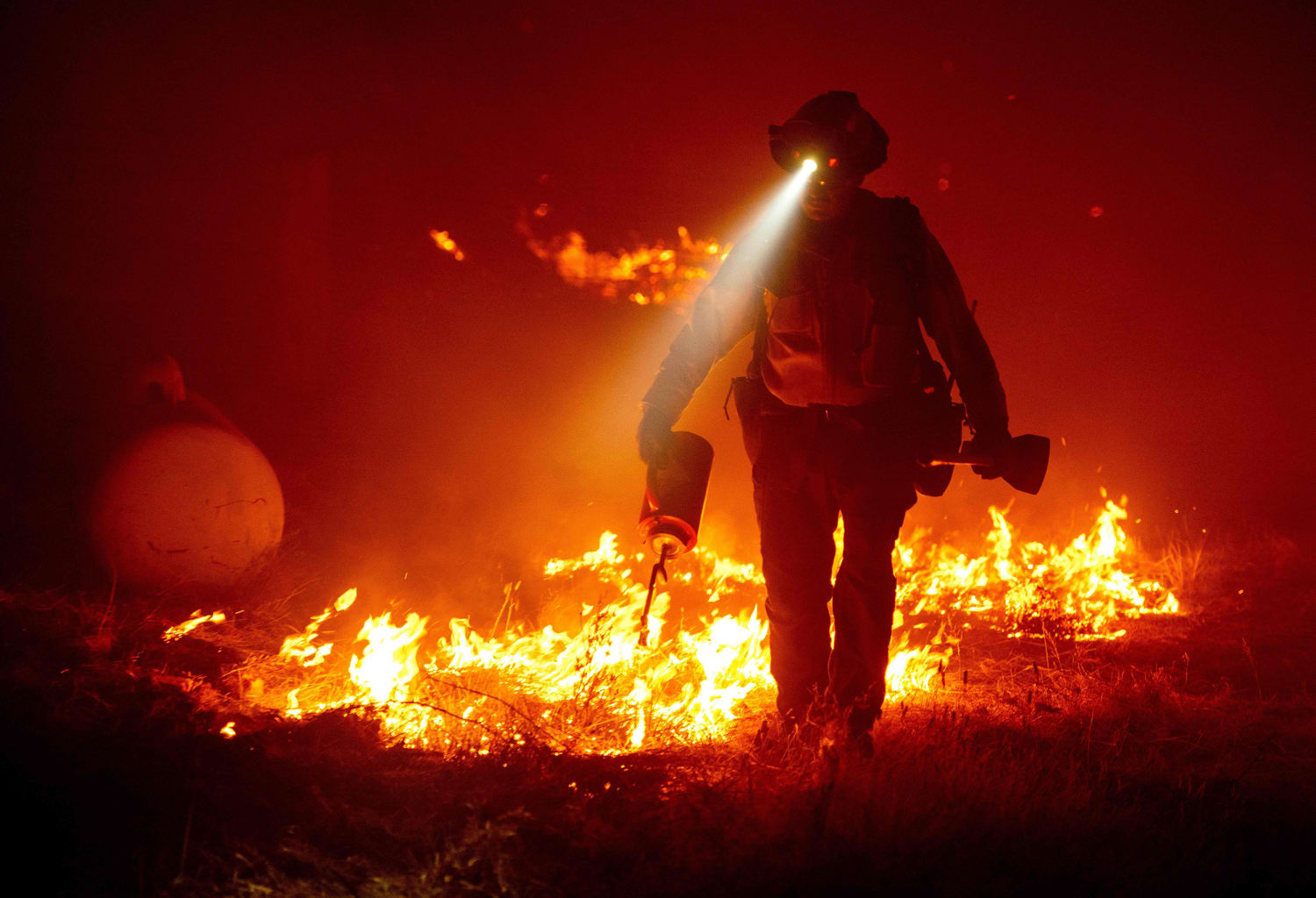
As a potentially historic fire season threatens the West, wildfire survivors and experts urged Congress on Thursday to act quickly to prevent more devastation amid a worsening drought and rising temperatures.
Members of the U.S. House Subcommittee on National Parks, Forests, and Public Lands heard sometimes emotional testimony about how to better manage forests, fight climate change and equip federal firefighters for what is likely to be another record-breaking wildfire season.
The virtual hearing wrapped up a few hours before a brush fire erupted in Southern California, forcing some residents in Ventura County to evacuate their homes.
“We’ve grown painfully accustomed to deadly and destructive blazes wreaking havoc throughout the West year after year,” said U.S. Rep. Russ Fulcher, a Republican who represents Boise, Idaho. “However, the human cost is far greater.”
Much of the West is experiencing severe to exceptional drought, according to the U.S. Drought Monitor, fueling concerns about another hot and dry summer.
In California alone, more than 98 percent of the state was experiencing some level of drought this week, compared to 42 percent this time last year, NBC Los Angeles reported. Meanwhile, about 75 percent of the American West is in a “megadrought” as waterways, including the Colorado River and Rio Grande that each supply water for millions of people and businesses, are showing low flows.
Despite warnings from experts, congressional leaders remain split on how to address the crisis. While some point to climate change, others blame forest management. Still, some lawmakers are pushing for federal agencies to hire more wildland firefighters, but others want states to take proactive roles in securing communities.
“We must dispel the notion that there is nothing we can do,” Fulcher said. “Too frequently many of my friends on the other side of the aisle have blamed climate change for an ever-growing multitude of sins, including wildfires, while ignoring the real culprit of our present disaster: Decades of insufficient forest management, not climate change, have led to led to overgrown, diseased and dying forests.”
U.S. Rep. Joe Neguse, a Democrat who represents Boulder, Colorado, and surrounding areas, countered that Congress must stop the “drain” of federal resources to land agencies and increase the federal wildland workforce. But at the heart of the issue, Neguse said, is climate change.
“For those of us who live in the West, wildfires are one of the most immediate and obvious impacts of climate change,” he said. “Wildfires today are nearly a year-round risk, burning larger areas at higher intensity and this is only projected to increase as the climate continues to warm.”
Neguse’s district was hit last year by two of the largest wildfires in Colorado’s history. The Cameron Peak Fire tore through more than 208,000 acres in Arapaho and Roosevelt National Forests in Larimer and Jackson counties and Rocky Mountain National Park, forcing more than 20,000 residents to evacuate. The East Troublesome Fire claimed nearly 200,000 acres and killed two people, NBC affiliate KUSA reported.
Dave Daley, an animal science expert and rancher from Butte County in Northern California testified Thursday that he had experienced historic wildfires up close. His family has raised cattle in the Plumas National Forest since his great-grandfather moved to California during the Gold Rush.
Last year, he lost most of his cow herd in the Bear Fire, which metastasized and became part of the devastating North Complex Fire that burned more than 300,000 acres across Plumas and Butte counties.
“Until you experience that, it’s really difficult for me to explain the devastation that occurred,” he said with a shaky voice. “Not only was my cow herd destroyed, the legacy of my family, my home, the entire ecosystem in the Plumas National Forest was devastated.”
Daley also witnessed the devastation wrought by the 2018 Camp Fire, which became the deadliest and costliest fire in California’s history. The inferno spread through more than 153,000 acres and killed 85 people, according to the California Department of Forestry and Fire Protection, or Cal Fire. Ignited by Pacific Gas and Electric Co. equipment, the fire caused $16 billion in damages.
In neighboring Berry Creek, an entire town was destroyed and at least 14 people were killed in September during the Bear Fire. Two years before the fire leveled Berry Creek, the community was selected to receive an $836,000 state grant to prune vegetation and clear fuel from potential fire spots, The Associated Press reported. But the forest management project was never completed because of red tape over vegetation thinning and pruning projects near two areas that became ground zero for the larger North Complex Fire.
During Thursday’s hearing, Rep. Doug LaMalfa, a Republican representing portions of Northern California, slammed the bureaucratic quagmire that halted the project and said Congress must streamline the environmental review process.
Daley’s “devastating testimony should serve as a wake-up call to all of us as legislators,” he said. “There is much frustration and much unnecessary loss in the West.”
LaMalfa is also among a handful of lawmakers pushing to reclassify federal forestry technicians as wildland firefighters. Currently, seasonal workers employed by the U.S. Forest Service to fight fires do not receive the same wages, benefits or protections offered to state and municipal firefighters.
In September, LaMalfa introduced the Federal Wildland Firefighter Recognition Act, which would direct the Office of Personnel Management to develop a separate and distinct wildland firefighter occupational series for employees whose main duties and responsibilities are fire prevention and suppression. The bill has been introduced several times over the years and failed. A similar bill was introduced in the Senate in 2019.
Riva Duncan, a former USFS officer and current executive secretary for Grassroots Wildland Firefighters, an association that advocates for federal fire personnel, shared emotional testimony about the toll increasingly dangerous fires are having on the men and women who dedicate their lives to protecting communities.
“People are at their breaking point, leaving a wake of mental health issues, suicides, high divorce rates and very concerning numbers surrounding high incidents of cancer and cardiovascular disease,” she said. “I have grown weary of losing great friends and colleagues, and I have grown weary with inaction.”
Source: | This article originally belongs to Nbcnews.com










